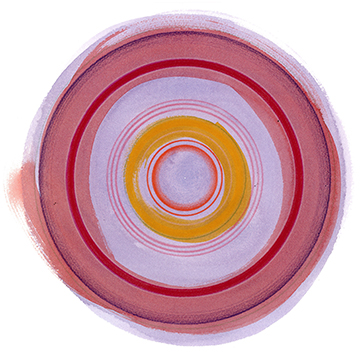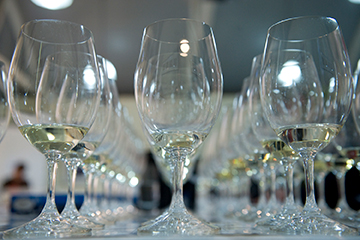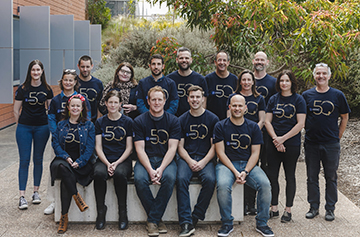Sustainability benchmarking reports now available
Art, wine and synaesthesia: AWRI artist in residence
Study trip to Bordeaux furthers research on ‘jam’ characters
Chardonnay tasting workshops launching in January
Order the latest AWRI staff publications online
New Managing Director |
|
 |
The AWRI Board announced today that Dr Mark Krstic has been appointed as the new Managing Director of the AWRI, commencing 1 February 2020. Dr Krstic takes over from Dr Dan Johnson, who is leaving to take up a position as Pro Vice Chancellor Research Innovation at Macquarie University. Dr Krstic comes to the position with more than 20 years’ experience in grape and wine research and research leadership, mostly recently as General Manager – Business Development at the AWRI. For more information, including a bio of Dr Krstic, see today’s new-md-awri-dec-2019. |
Sustainability benchmarking reports now availableThe Sustainable Winegrowing Australia team visited a number of regions earlier this month, presenting the highlights and opportunities for improvement from the regional results for 2018/19. This coincided with the release of the member data and workbook benchmarking reports. If you are a member and have not yet looked at your reports, log in over the Christmas break and review your results. The AWRI is on the look-out for vineyards and wineries that are performing well, especially in the areas of waste and fertiliser management. If you’re doing something a bit different, send an email to helpdesk@awri.com.au. There is lots of information about the Sustainable Winegrowing Australia on the AWRI website. If you are interested in joining Sustainable Winegrowing Australia, everything you need to get started can be found in the Program Guide and updated User Manual. If you are a member and have not yet completed the membership renewal for 2019/20, you can still do so by logging in to the Sustainable Winegrowing Australia website. |
|
Art, wine and synesthesia: AWRI artist in residence |
|
 |
The AWRI has been hosting a Brisbane-based artist, Elizabeth Willing, for the last six months as part of an Australian Network for Art and Technology initiative. Elizabeth has been mainly working with the sensory team, looking at associations of colours and shapes with wine flavours, using sensory analysis techniques. This has resulted in fascinating visual artworks that relate to specific red wines. The wines were also assessed for preference with the matching or non-matching artwork present, to better understand how the wine consumption experience can be enhanced through the setting. The art pieces produced will be incorporated into an exhibition, and the results of the sensory testing will be summarised in publications shortly. Elizabeth has also created graphics for disseminating research outcomes in her time at the AWRI, including a visualisation of the grapevine seasonal cycle. For more information see Elizabeth’s blog http://willing2019.blog.anat.org.au/ |
Rapid sensory method assessedResearch comparing the rapid sensory method Pivot© Profile with the more traditional method of descriptive analysis has just been accepted for publication in the peer-reviewed journal Food Quality and Preference. The study found that two groups of experts using the rapid method (winemakers and international sommeliers) gave very similar responses to a set of Shiraz wines from multiple regions, and that the data obtained were comparable to that of the more common, time-consuming method of quantitative sensory descriptive analysis. The Pivot© Profile method is therefore well suited to use by winemakers to generate detailed sensory profiles of wines. The full paper (‘In press’ version) detailing these results is accessible now via the AWRI library: |
|
Study trip to Bordeaux furthers research on ‘jam’ charactersUniversity of SA and AWRI PhD researcher Jana Hildebrandt has recently completed a study trip to Bordeaux thanks to funding from the Great Wine Capitals Travel Bursary. Her trip provided an opportunity to strengthen the AWRI’s collaborative ties with L’lnstitut des Sciences de la Vigne et du Vin (ISVV) through the existing ‘BAG’ Alliance. Jana’s PhD research centres around the evolution of ‘jam’ and ‘raisin’ character in grapes and wine, and aligns with objectives of both the AWRI and the ISVV, in the latter case evaluating the characteristic ‘dried fruit’ character of aged Bordeaux wines. While in Bordeaux, Jana analysed her research samples for characteristic Bordeaux compounds using methods and techniques not currently available at the AWRI and compared the concentrations of key compounds in Australian wines and grapes with those in Bordeaux-sourced wines. Interestingly, while the compounds responsible for the traits in each country appear to be similar, sensory analysis indicated that the overall aroma impression was significantly different between wines from each country. Jana brings back with her a wealth of knowledge on new analytical techniques that she plans to integrate into her PhD research. |
|
Chardonnay tasting workshops launching in January |
|
 |
Each vintage since 2016 the AWRI has made a series of wines from single batches of grapes, changing one variable in each fermentation, with the resulting wines being presented to winemakers in workshops around Australia. The 2019 trial was conducted with Chardonnay (the first time a white variety has been featured) and the workshops presenting the Chardonnay trial wines are kicking off in January across SA, Victoria and WA before moving on to other states in February. This workshop provides a great opportunity to explore and compare the stylistic and compositional differences achieved when one winemaking variable is changed at a time. Visit the AWRI events calendar for workshop dates and online registration or contact events@awri.com.au for more information. |
Awards and achievementsA team from the AWRI and Wine Australia has completed CSIRO’s ON Prime program with a win! The program creates connections between research, science and business, helping Australia’s publicly funded researchers to develop an entrepreneurial mindset and focus their science for maximum real-world impact. Over the past ten weeks, team ‘Winegrape Extracts’ has explored the potential for natural flavours extracted from winegrapes to be used in wine products and other beverages and foods. The team members conducted more than 100 conversations across different industry segments, participated in coaching sessions and learned from a team of program mentors. At the program’s final showcase event, the team was awarded the facilitator prize ($2,000 cash) for best Adelaide team. A short video about their proposed product can be viewed here. For more information, contact Dr Mark Krstic on mark.krstic@awri.com.au. |
|
Celebrating AWAC 50 |
|
 |
Earlier this month the AWRI presented its 50th Advanced Wine Assessment Course. Since the first course was held in 1992, a total of 1,256 wine industry personnel have completed the AWAC, improving their sensory skills and learning what it takes to be a wine judge. As part of the celebrations of this milestone, past guest judges and others involved in the course over its history were invited to dinner with the current AWAC class. For more information about the course or to register your interest in AWAC 51, visit the AWAC page on the AWRI website. |
Order the latest AWRI staff publications onlineAccessing the latest AWRI publications is easy. Visit the AWRI Publications web page to:
The AWRI’s most recent publications are listed below. 2109 Essling, M. Ask the AWRI: regulatory changes to the use of botrytis agrochemical. Aust. N.Z. Grapegrower Winemaker (668): 48-49; 2019. 2110 Bindon, K.A., Kassara, S., Solomon, M., Bartel, C., Smith, P.A., Barker, A., Curtin, C. Commercial Saccharomyces cerevisiae yeast strains significantly impact Shiraz tannin and polysaccharide composition with implication for wine colour and astringency. Biomolecules 9(9): 466; 2019. 2111 Coulter, A., Cowey, G., Essling, M., Hoare, T., Holdstock, M., Longbottom, M., Simos, C., Johnson, D. Vintage 2019 – observations from the AWRI helpdesk. Wine Vitic. J. 34(4): 27-29; 2019. 2112 Dry, P. Corvina. Wine Vitic. J. 34(4): p. 59; 2019. 2113 Stanstrup, J., Broeckling, C.D., Helmus, R., Hoffmann, N., Mathé, E., Naake, T., Nicolotti, L., Peters, K., Rainer, J., Salek, R.M., Schulze, T., Schymanski, E.L, Stravs, M.A., Thévenot, E.A., Treutler, H., Weber, R.J.M., Willighagen, E., Witting, M., Neumann, S. The metaRbolomics Toolbox in Bioconductor and beyond. Metabolites 9(10): 200; 2019. 2114 Ratnayake, S., Stockdale, V., Grafton, S., Munro, P., Robinson, A.L., Pearson, W., McRae, J.M., Bacic, A. Carrageenans as heat stabilisers of white wine. Aust. J. Grape Wine Res. 25(4): 439-450; 2019. 2115 Walker, R.R., Blackmore, D.H., Clingeleffer, P.R., Holt, H., Pearson, W., Francis, I.L. Effect of rootstock on yield, grape composition and wine sensory attributes of Shiraz grown in a moderately saline environment. Aust. J. Grape Wine Res. 25(4): 414-429; 2019. 2116 Parker, M., Onetto, C.A., Hixson, J.L., Bilogrevic, E., Schueth, L., Pisaniello, L., Borneman, A., Herderich, M.J., de Barros Lopes, M.A., Francis, I.L. Factors contributing to interindividual variation in retronasal odor perception from aroma glycosides: the role of odorant sensory detection threshold, oral microbiota and hydrolysis in saliva. J. Agric. Food Chem. DOI: 10.1021/acs.jafc.9b05450; 2019. 2117 Cowey, G. Ask the AWRI: What does the latest research say about barrel sanitation against Brett? Aust. N.Z. Grapegrower Winemaker (669): 76-77; 2019. 2118 Romanini, E., McRae, J.M, Colangelo, D., Lambri, M. First trials to assess the feasibility of grape seed powder (GSP) as a novel and sustainable bentonite alternative. Food Chem. 305: 125484; 2019. 2119 Longbottom, M. Ask the AWRI: Sustainable Winegrowing Australia. Supporting the nation’s growers and winemakers in demonstrating and improving their sustainability. Aust. N.Z. Grapegrower Winemaker (670): 45-46; 2019. 2120 Scrimgeour, N., Wilkes, E., Bartowsky, E. Making sense of yeast assimilable nitrogen (YAN). Aust. N.Z. Grapegrower Winemaker (670): 47-50; 2019. 2121 Wilkes, E., Wheal, M. Elements of wine … nearly every known naturally occurring element has been found in at least some wines … Chem. Aust. (November/December): p. 37; 2019. 2122 Pearson, W., Schmidtke, L., Francis, I.L., Blackman, J.W. An investigation of the Pivot© Profile sensory analysis method using wine experts: comparison with descriptive analysis and results from two expert panels. Food Qual. Pref. DOI: 10.1016/j.foodqual.2019.103858: 2019 2123 Hirlam, K., Scrimgeour, N., Wilkes, E. The impact of temperature fluctuations on closure performance. Aust. N.Z. Grapegrower Winemaker (671): 59-61; 2019. 2124 Godden, P. Ask the AWRI: Grape solids in white winemaking. Aust. N.Z. Grapegrower Winemaker (671): 73-74; 2019. 2125 Johnson, D. 2019 Report. Aust. N.Z. Grapegrower Winemaker (671): 4p.; 2019. 2126 Watson, F.T., Smernik, R.J., Doolette, A.L. Thermal degradation of phytate produces all four possible inositol pentakiphosphates as determined by ion chromatography and 1H and 31p NMR spectroscopy. Phosphorus Sulfur Silicon Relat. Elem. 194(12): 1140-1148; 2019. 2127 Luo, M., Li, H., Chakraborty, S., Morbitzer, R., Rinaldo, A., Upadhyaya, N., Bhatt, D., Louis, S., Richardson, T., Lahaye, T., Ayliffe, M. Efficient TALEN-mediated gene editing in wheat. Plant Biotechnol. J. 17(11): 2026-2028; 2019. |
|
AcknowledgementsThe AWRI acknowledges support from Australia’s grapegrowers and winemakers through their investment body, Wine Australia, with matching funds from the Australian Government. The AWRI is a member of the Wine Innovation Cluster in Adelaide, South Australia. |
|

